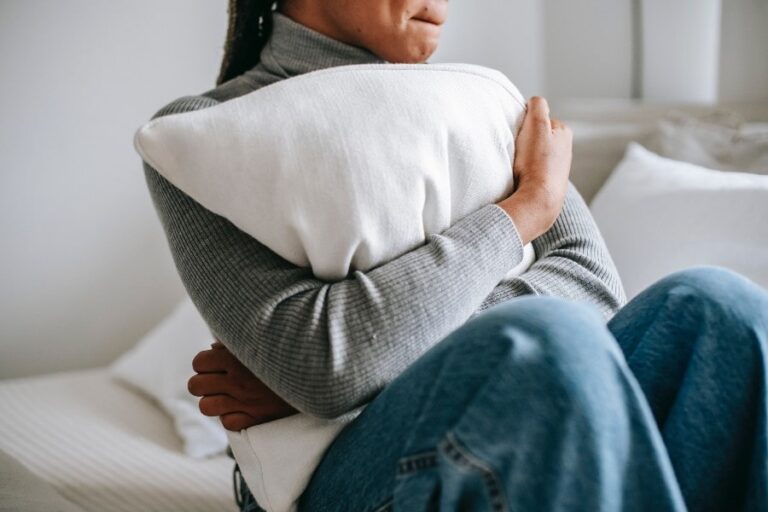We locked down hard in March of 2020. Since moving to Colorado from South Carolina in 2018, both my husband Adam and I had been working from home.
We had a rhythm that was based largely around the kids’ school and daycare schedules and his work schedule, since those were less flexible than mine as a coach and business owner. But suddenly all four of us were home, together, all the time.
In the beginning, my focus was on the kids’ emotional health. This was a huge change for them and I woke up every day determined to mitigate the fear and possible trauma as much as possible.
We talked. (A lot.) We played. Adam and I loved on them. We made sure they knew what was happening in the wider world and that we were going to be okay. And sure, sometimes my stomach seized into knots that had me crying in pain, but my kids were okay. That’s what mattered.
The author and her family in 2017.
The Beginning of the Fall
I curated a series of conversations with moms around the country about how to care for ourselves and our families through the lockdown. I did two of those videos with migraines so bad I was seeing spots, but I made sure to tell other moms to take care of themselves.
As summer progressed, I interviewed moms for an article about school reopening plans. And through all of this I was falling apart so slowly that it took months for me to fully notice.
I didn’t so much hit a wall of burnout as I slowly crumbled. My head felt fuzzy, my stomach hated everything I put into it, my migraines stole days from me. And even when I was ‘okay’, everything was too big, too loud, too bright, too complicated.
I dreamt of death and woke feeling exhausted. My kids were doing well in the transition to online school, Adam was settling into the new routine, and I felt like a pillar of dust that would blow away with the next strong wind.
Every Friday I’d talk with my therapist on the phone. We were doing really good work, uncovering family stories that held me hostage layer by layer. I committed to not repeating these cycles with my own children, but that struggle became so much more difficult when we never got a break from each other.
There was no time or distance to process.
Reaching My Breaking Point
One Friday I told my therapist that I wasn’t going to do ANYTHING the next day. I was taking the entire day off. I had some books to read, some movies to watch, coloring books, and a sewing project—but I really just wanted to sleep. I wanted to wake up in the morning, make coffee, and take it back to bed. That sounded glorious—and subversive. She was ecstatic.
And that’s how it started. It was a weekend thing. Until one day it wasn’t.
I told Adam that I needed to lay down in the afternoon and asked him to wrangle the kids. After a morning of school, I gave the kids lunch and sent them upstairs with him while I went downstairs to the basement and got into bed. FOR TWO HOURS.
It didn’t fix anything.
It felt so good to lay my body down in the middle of the day, in the quiet. But I worried about how Adam would get work done. I worried that the kids would feel like I’d abandoned them. I worried about all the work I wasn’t getting done. I worried about what this said about me—that I was lazy, that I was decadent, that I didn’t truly care about my family.
I was definitely not my ancestor’s wildest dream. I was a living betrayal of that dream.
Adam said it hadn’t been a problem at all. The kids had colored and played—had just been kids—while he worked. He told me I shouldn’t feel guilty for taking time to figure out what I needed.
That night, I slept better than I had in months. And I remembered something a sleep consultant had told us during my son’s epic sleep struggles in toddlerhood: sleep begets sleep. Naps are healing.
The next day I wasn’t going to rest, and then I saw a tweet from Tricia Hersey, The Nap Bishop, on my timeline. Ms. Hersey’s work is dedicated to the healing and liberatory power of rest. The Nap Ministry account on Twitter is the only social media account I have notifications turned on for because I always need to hear her message.
“If you can’t nap or sleep well, you can still sit or lay down and daydream and breathe. You can still slow down. You can recline. You can mediate. You can rest your eyes.”
And so day after day after day I sent myself downstairs in the afternoon.
Sometimes I slept. Sometimes I read. Sometimes I cried. Sometimes I just stared at the ceiling.
The mysterious stomach ailments that had plagued me most of the year began to back off. My migraines slowed and eventually disappeared. My anxiety retreated. I began to get tired earlier and was able to sleep through the night. My nightmares came less frequently.
And still…the guilt…
Giving Myself Permission to Rest
Even as I was more engaged in the mornings and evenings, the guilt rode me. Even as my mental and physical health improved, the guilt wrapped itself around me. Even as I had breakthrough after breakthrough in therapy and in my business, the guilt whispered in my ear.
This is not what mothers do.
This is sure as hell not what Black mothers do.
Who the F did I think I was to take this time AND DO NOTHING WITH IT?!?!?
I am my grandmother’s namesake. She conceived 12 children and raised 10, in the 1930s and 40s in Charleston, South Carolina, before dying of breast cancer when my father was 15. She was, by all accounts, brilliant, hilarious, petty, loving, and a hardass. She fostered “an environment of excellence” in her home—all of her children ended up with college degrees. My father has his EdD. Respectability and excellence aren’t politics in my family, but religion.
And rest?
Rest is a reward. Rest is earned. Rest comes after.
The idea that I could be healing through rest, that I could begin to thrive through rest, and that my family could thrive while I rested and BECAUSE I was resting was simply not something that anyone in my family could ever understand.
So… I said nothing.
… the more I rest the less I yell. The more I rest the better I listen. The more I rest the more clearly I see my own path forward.
Until, one day, while my therapist and I were discussing this guilt that I simply could not shake, she suggested that I talk to someone in my family about all of this. That I talk to Gladys Graham Seabrook, my grandmother.
But how do you get permission to be yourself from a dead grandmother you never knew? From someone who was revered by your family for her excellence and sainted for her suffering when part of my healing work was rejecting the need for excellence and suffering? Wouldn’t she just think that I was lazy and ridiculous and weak?
I was definitely not my ancestor’s wildest dream. I was a living betrayal of that dream.
No matter where I go or what I do, I am a southern Black woman. I am a Seabrook. Betraying my family legacy—choosing to step off of the path forged by my ancestors? That is no small thing. The stories I was raised on were of enslaved people striving for freedom, for knowledge, of newly freed people teaching others all they know.
Each generation focused on making material gains for the next: safety, security, education, wealth. My father bought property our family had once been enslaved on. That is what we do, we strive and shine and return and own.
I was choosing to nap instead of writing a bestseller or growing a six-figure business or getting an advanced degree.
I could almost hear her voice telling me to GET UP AND GO TO WORK!
Why are you laying down in the daylight?
Because I can.
Because it helps.
Because the more I rest the less I yell. The more I rest the better I listen. The more I rest the more clearly I see my own path forward. The more I rest the stronger I feel. The more I rest the more my children see rest as valid.
I am grateful. I am so grateful for the women who came before me, for the strength and grace and grit and hope and love of the Black mothers that led to me. For Gladys Graham Seabrook, I have nothing but love and gratitude in my heart. She made me possible.
And yes, I have betrayed her. I have stepped off of the Graham path of excellence—the Graeme one, too.
I apologized to her for that, for not being what she may have dreamt of.
And then I laid my body down, pulled the covers up, and closed my eyes.

















